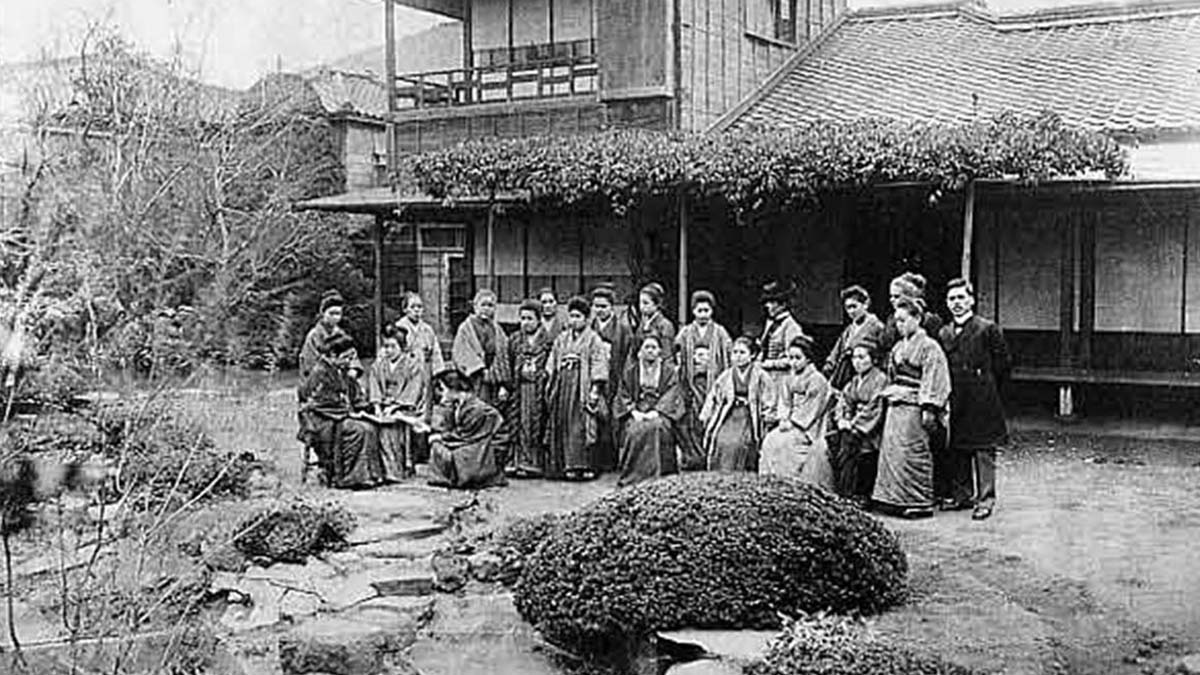


Most likely, Tsuda Umeka’s father regarded her as expendable. He was so angry when his second child was a second daughter, he stormed out of the house.
Still, during Japan’s rapid modernization campaign in the late 19th century, he had become interested in the education of girls, and especially the possibility of girls studying in Western countries as exchange students. So, when that opportunity arose for his six-year-old daughter, he volunteered Umeka, known as Ume, to go.
Ume ended up in Washington, DC, in the family of Charles Lanham, the secretary of the Japanese legation to the United States. Lanham and his wife had no children of their own, but treated Ume as if she were their own child. After about a year in their home, she asked to be baptized.
When she returned to Japan in 1882, she had nearly forgotten the language and was shocked by the inferior status of women in Japanese culture. At the time, Japan was experiencing a backlash against Western influence, and a resurgence of very traditional Neo-Confucian ideals. Seeing this, she decided that she would never enter a traditional Japanese marriage, but only one built on mutual love and respect like she’d seen in America.
Ume was soon hired as a tutor to the children of Itō Hirobumi, soon to be prime minister of Japan. In 1885, she began teaching at a school established by the Imperial Household to educate its daughters in traditional manners and customs, to prepare them to be wives and mothers. Troubled, Ume began to think that her own “unique destiny” was to improve educational opportunities for Japanese women. In order to do that, she needed more education. And so, she returned to the United States.
Ume attended Bryn Mawr College from 1889-1892. There, she studied English literature, German, philosophy, and biology. She also attended St. Hilda’s College, Oxford University. She did so well that Bryn Mawr offered her a fellowship to pursue an advanced degree. She refused, intent on returning to the royal family and Japan in order to improve women’s education.
The only school at that time that provided higher education for women in Japan was the Tokyo Women’s Normal School. Ume decided that others needed the same opportunity she’d had abroad. She began giving public speeches about the subject and, with the help of some Quaker friends, raised $8,000 to provide scholarships for Japanese women.
In Japan, Ume resumed teaching, while writing and lecturing about the status of women. In 1900, realizing that girls would never be given the same opportunities as boys in existing schools, she resigned from her post and established Joshi Eigaku Juku, or The Women’s Institute for English Studies.
Following the example of Bryn Mawr, which insisted that students meet the same standards demanded by Harvard, she determined that her school would follow the standards of the very rigorous and prestigious Tokyo University. The school focused on liberal arts and discussion of contemporary topics, with the goal of developing students’ personalities and encouraging creativity.
Ume had to work very hard to support herself and fund the new school. In addition to teaching at her own school, she took jobs at other schools, tutored daughters of friends, and engaged in fundraising. Her efforts paid off when, in 1903, the school was approved as a vocational school by the Ministry of Education. Under Ume’s leadership, the school’s standards were so rigorous that, in 1905, it became the first school in Japan whose graduates did not need to take government examinations in order to obtain a teaching license.
Ume’s unrelenting efforts to support her school and promote women’s education took its toll on her health. She suffered a stroke in 1919, and retired to a cottage in Kamakura. She died in 1929. After her death, the Women’s Institute for English Studies was renamed in her honor, eventually becoming Tsuda College in 1948. It is the oldest and most prestigious private women’s college in Japan, with over 27,500 graduates now active in all walks of life.
Like other educational reformers of the period, Tsuda Umeka recognized the central connection between Western learning and Christianity. Her concern for women’s education was born from her childhood experience in America, and the influence of the Quakers. Her sense of personal calling was born out of a recognition of the inherent connection between Christianity, education, and the value and potential of women, a potential that the dominant worldview of her native culture lacked.
Hers is one more example of how the Christian view of life, the world, and the human person has inspired, informed, and energized education across the globe.
Resources:
Why The Church Has a Long History of Leading in Education
John Stonestreet | BreakPoint | September 22, 2021
The Incredible Opportunity for Christian Education
John Stonestreet | BreakPoint | September 15, 2021
Have a Follow-up Question?
Up
Next

Related Content

© Copyright 2020, All Rights Reserved.













